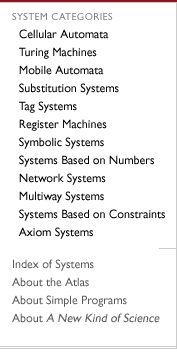|
About Simple Programs
The programs in the Atlas are among the simplest computational
systems
possible. But despite their simplicity, they are capable of computations
as sophisticated as anything in our universe--and exhibit such a range of
behavior that this website has been created to begin documenting it.
These programs are not like those written in familiar languages like C
or
Java. Instead of the thousand-page specifications typical of
commonplace
programming languages, the languages of these programs are usually
described by a few sentences or a single picture. And while practical
languages are designed so that a human can construct predictable
structures, those of the Atlas have no such restriction--which is
what
allows them to so easily exhibit complex and unexpected behavior.
The fact that these systems follow a definite set of rules is their
main
similarity to concepts we are familiar with from computers. But science is
based on the idea that nature also follows a definite set of rules. For
the last three hundred years it has been assumed that these rules are
mathematical. Yet as the Atlas demonstrates, existing human
mathematics
has not concerned itself with arbitrarily general systems. And if nature
does follow definite rules, the computational system it defines can be
expected to share properties which a vast range of other systems. The
behavior discovered in the simple programs of the Atlas can
therefore be
expected to occur in nature--and processes that occur in nature will
not be fundamentally different than what can be modelled with
abstract systems.
Why this is so may not be immediately obvious. For certainly abstract
computer programs and systems in nature are built up from completely
different components. But a key unifying idea is that all processes,
whether they are produced by human effort or occur spontaneously in
nature, can be viewed as computations. And while one may have thought
that
computations performed by systems can vary as arbitrarily as their
underlying setup, the surprising fact is that they do not. Effectively the
same behavior emerges in a broad range of systems, completely independent
of their details.
The Principle of Computational Equivalence takes this idea further,
asserting that almost all processes that are not obviously simple
correspond to a computation of equivalent sophistication. From this
emerges a new kind of unity: for across a vast range of systems, from
simple programs to brains to our whole universe, the principle implies
that there is a basic equivalence that makes the same fundamental
phenomena occurs, and allows the same basic scientific ideas and methods
to be used.
So besides giving new building blocks for understanding the behavior of
our Universe, working within the framework of simple programs can also
give deep insight into a surprisingly wide array of issues outside of the
mathematical formalism of traditional science--from the ultimate scope
and limitations of science, to the question of human uniqueness and free
will. And because simple programs are already capable of great
sophistication, there is rarely a reason to go beyond them. One
consequence is that besides experimentally addressing questions of
scientific interest, they can be of great value from an educational point
of view. On the one hand, if the essence of some powerful idea can be
distilled into some simple structure, it will be easier for the mind to
absorb. And on the other, the simpler a system is, the more likely it is
to appear in a variety of contexts.
Yet despite all the useful applications of simple programs, it is
important to keep in mind that NKS is a basic science, with its own set of
questions that are worthwhile independently of its various connections.
And although the PCE asserts a certain uniformity regardless of individual
particularities, it also implies that these particularities are the only
thing that make any system--including us humans--special. For they are
what lead to the phenomenon of computational irreducibility, and assure
that there will be an endless series of questions worth asking - and
answering within the structure the Atlas now provides.
Kovas Boguta
Wolfram Science Group
| 